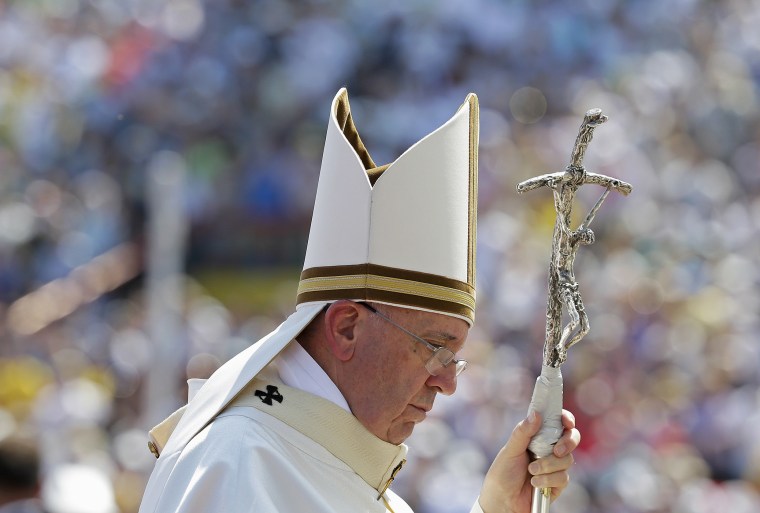Calling climate change a mostly man-made problem, Pope Francis is urging the global community this week to take swift action on averting an “unprecedented destruction of the ecosystem,” a leaked draft of a document the pope will send to church leaders has revealed.
“Humanity is called to take note of the need for changes in lifestyle and changes in methods of production and consumption to combat this warming, or at least the human causes that produce and accentuate it,” writes Pope Francis in a 191-page encyclical, published three days early by the Italian magazine, L’Espresso, and translated into English by The Guardian. “Numerous scientific studies indicate that the greater part of the global warming in recent decades is due to the great concentration of greenhouse gases … given off above all because of human activity.”
RELATED: Pope Francis to meet with gay activist
The encyclical -- or papal letter to bishops -- was supposed to be released on Thursday, three months ahead of the pope’s scheduled visit to the U.S., where he plans to address the United Nations as well as a joint meeting of Congress. But the editor of L’Espresso obtained the document early and decided to publish it on Monday, the magazine’s Vatican correspondent told the Associated Press. On Tuesday, the Vatican indefinitely suspended the press credentials of that correspondent, saying that L’Espresso had been “incorrect,” according to the AP.
Pope Francis has spoken out about ecology and the dangers of climate change in the past, but he has never before devoted an entire encyclical to the topic -- a move that indicates the growing significance of the issue within the Catholic Church. Francis said in January that he hoped the forthcoming encyclical would encourage U.N. negotiators to make bold decisions addressing climate change at their annual conference in December. Following talks last year in Lima, Peru, Francis criticized climate negotiators for having a “lack of courage.”
Environmentalists and climate change deniers alike will undoubtedly be paying close attention to the encyclical’s reception in the U.S., where some Republican lawmakers have consistently disputed any human contribution to global warming. Many of the 2016 GOP presidential hopefuls are also Catholic -- including Jeb Bush, George Pataki, Marco Rubio, Ted Cruz, Bobby Jindal and Chris Christie -- and their disagreements with the pope on this issue could factor heavily in the election as they position themselves against Hillary Clinton, who has pledged to do “whatever it takes” in order to convince Americans that climate change is real.
One of the pope’s most outspoken critics among the emerging GOP presidential field has been former Pennsylvania Sen. Rick Santorum, who is also Catholic. Earlier this month, Santorum told Fox News host Chris Wallace that the church should stay of the climate debate.
RELATED: Putin makes visit to Vatican amidst criticism of Russia’s role in Ukraine
“The church has gotten it wrong a few times on science, and I think that we probably are better off leaving science to the scientists and focusing on what we do -- what we’re really good at, which is -- which is theology and morality,” Santorum said during the June 7 interview. A spokesman for the Republican presidential candidate did not return msnbc’s request for comment Tuesday regarding the encyclical.
Without naming names, the pope shot back against those standing in the way of a solution to climate change, saying in the leaked draft that their attitudes, “even among believers, range from negation of the problem, to indifference, to convenient resignation or blind faith in technical solutions.”
